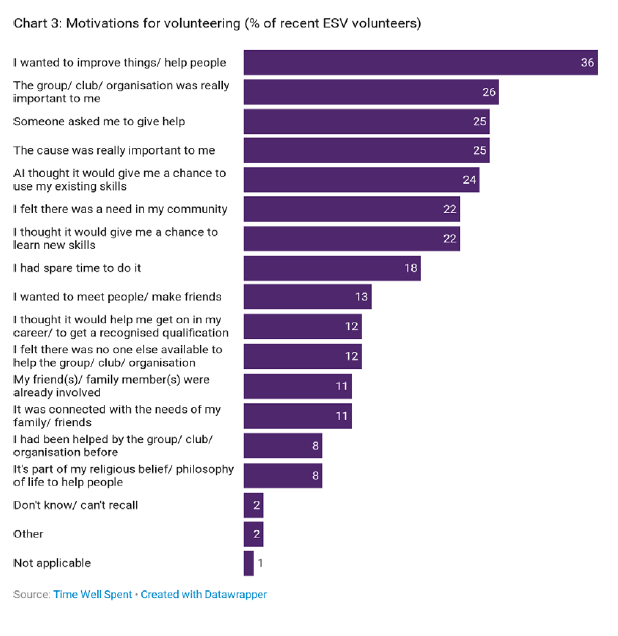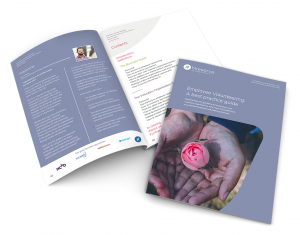How to engage volunteers | Tips for charities
Recent research from the NCVO has found that staff volunteers are less engaged and positive about their volunteering experiences than ‘traditional’ volunteers.
56% non-EVS volunteers report being ‘very satisfied’ compared to just 39% of staff volunteers.[1]
When we refer to staff volunteers, we mean individuals who are supported by their employer to donate unpaid work to a voluntary organisation. This is often through an EVS (Employee Volunteering Scheme).
Why the dissatisfaction?
Some of this disengagement may stem from the approach of the employer. A lack of encouragement or support on their part may dampen your staff volunteers’ enthusiasm.
There could also be factors in your own organisation. Your staff volunteers could have misaligned expectations of their placement(s), or be unsure how their work is making an impact.
If you are concerned about the levels of engagement in your organisation, ask staff volunteers to provide feedback:
- What are their barriers to volunteering, whether at their place of work or in your organisation?
- Do they feel valued and that their work is making an impact?
- Would they like to share their thoughts on your communications, support or range of opportunities?
Once you have the results, you can start taking positive actions.
How to address your staff volunteers’ challenges.
Lack of encouragement from their employer:
Over a third (34%) of staff volunteers stated that their employer encouraged them in their volunteering ‘not very much’ or ‘not at all’.[2]
Your impact here may, of course, be limited by an employer’s approach to staff volunteering.
However, if you do have a positive relationship with them, consider starting a conversation around the following:
- How can you support their Employee Volunteering Scheme?
- Can you offer to talk to potential volunteers about opportunities and help manage expectations?
- Can you provide flexible volunteering opportunities, to help staff better balance work and volunteering time?
- Are the skills your organisation needs relevant to the skillset of your business partner?
- Can you provide placements that use the skills your business partner wants their staff to develop?
Need for greater flexibility:
34% of staff volunteers cited their volunteering experience as ‘too structured/formalised’. This is compared to just 11% of non-EVS volunteers.[3]
Your staff volunteers may feel they struggle to balance volunteering projects with their day-to-day work. They could also be unclear on how much time they are ‘allowed’ to spend on volunteer activity during work hours.
- Ask whether your volunteers know how much time and resource they can spend on volunteering activities. If not, consider raising some of the discussion points above with the employer.
- Review how your volunteer activity can be delivered. Do staff volunteers have to be on-site, or can work be delivered digitally?
- Long-term relationships don’t need to incur regular volunteering hours (e.g. weekly placements). Instead, explore building relationships with your staff volunteers through micro-projects or ongoing activities that they can dip in and out of during the year.
Mismanaged expectations:
The NCVO found that staff volunteers’ experience may be impacted by ‘not being prepared for what their volunteering would involve’.
- Be transparent about what time commitments you require from staff volunteers. Explain what you need to employers and volunteers upfront, so all parties are clear on what is expected.
- Offer to speak to staff about your cause and the roles they could undertake with you. Consider asking several of your team members to share their stories for a range of perspectives.
- Draw clear boundaries between what you expect from staff volunteers and your own employees.
- Talk openly about the situations or potential challenges staff volunteers may face..
- Discuss what staff volunteers wish to learn or achieve from their work with you. What impact can they make on your organisation and can they develop the skills/experience they’re looking for with you? Equally as important is whether those skills or experience will actively benefit your cause.
- Explain what support is on offer for staff volunteers. Is there a Point of Contact they can reach easily? Can you provide training or guidance for volunteers?
Lack of recognition:
55% of staff volunteers agreed that recognition was important to them, whilst almost a quarter (21%) disagreed with the statement ‘I feel recognised enough for the unpaid help I give.’ Compare these figures to non-EVS volunteers at 37% and 10% respectively.[4]
The NCVO found that the biggest motivation for staff volunteers was ‘to improve things/help people’. Tap into this motivation to further engage your volunteer-force.
- Where possible (and it may not always be so!), have a one-to-one induction with staff volunteers to welcome them into your organisation and chat through their motivations and objectives.
- Talk to them about what impact their role can have on your cause and where you can see them making a difference.
- Try to quantify the impact of their work. How much would it cost you to outsource the skills they are providing, for example? Or how much additional time would your team have to spend on a particular project?
- Provide examples where staff volunteers have made an impact before and discuss the kind of work they did, the relationship you built and what the end results were.
- Where volunteers have made a truly positive impact, can you feedback to their employer?

Quality staff volunteering
‘Volunteering that is (and feels) truly voluntary is one of the basic cornerstones of a quality volunteer experience.’ – NCVO, 2019
Staff volunteers who feel engaged, supported and recognised are less likely to feel that they are ‘made’ to volunteer through their workplace. As a result, they are more likely to deliver activities that have a positive impact on your case and, hopefully, engage in longer-term relationships with your cause.
 Discover more: Download your guide to employee volunteering
Discover more: Download your guide to employee volunteering
Develop stronger partnerships with businesses, ensure an EVS is delivering the benefits you need, and engage your staff volunteers.
Filled with practical advice, simple checklists and sector insights, download your free guide now.
[1] ‘Time Well Spent’ Research Report, NCVO, June 2019; [2] NCVO 2019; [3] NCVO, 2019; [4] NCVO, 2019




